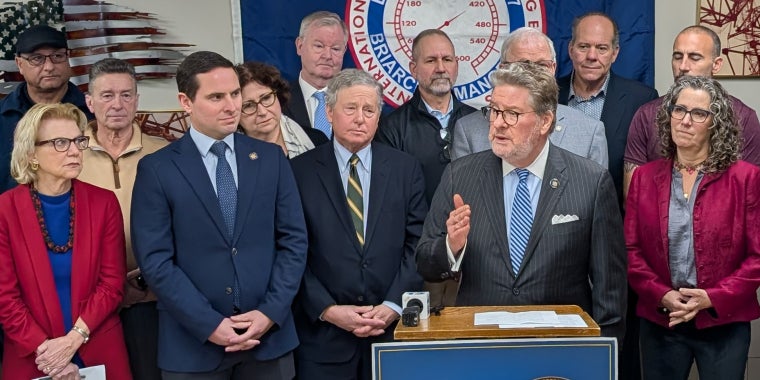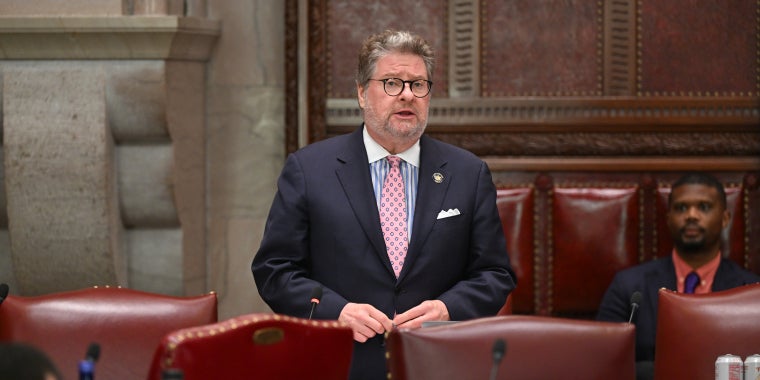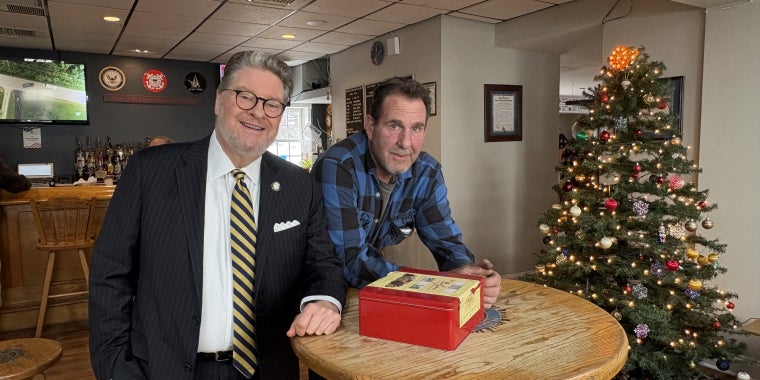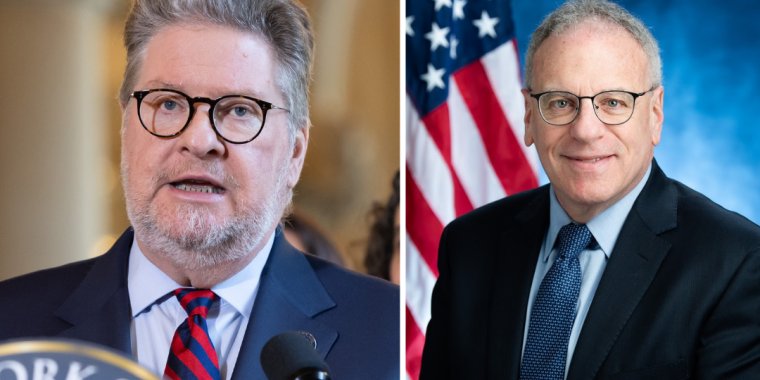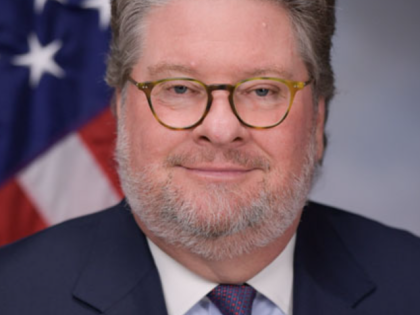
Sen. Harckham, Asm. Woerner, Advocates Urge Support for Clean Fuel Standard Bill
May 27, 2025
-
ISSUE:
- Senator Harckham. SD40
- Clean Fuel Standard
- EV Vehicles
- Clean Energy
- CLCPA; clean energy mandates
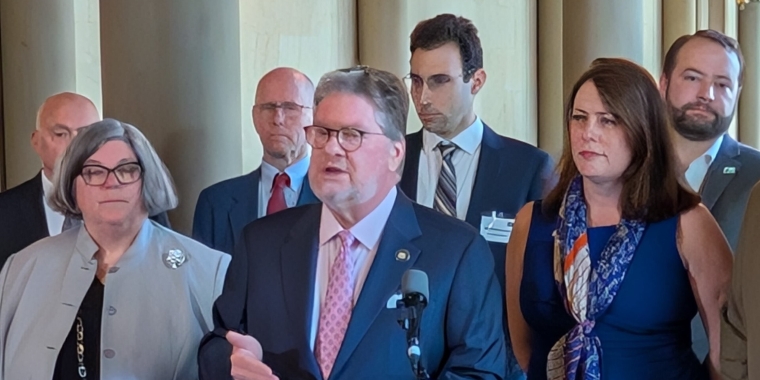
State Sen. Pete Harckham at the podium during the press conference, flanked by Asm. Carrie Woerner and NYLCV President Julie Tighe
Albany, NY – New York State Senator Pete Harckham and Assemblymember Carrie Woerner, along with leaders from environmental and agricultural groups, labor and the Clean Fuels coalition, urged support for the Clean Fuel Standard Act of 2025 (CFS) at a press conference today held at the State Capitol.
The Clean Fuel Standard Act of 2025 (S.1343A / A.472), which was introduced by State Sen. Kevin S. Parker and Asm. Woerner, will reduce on-road transportation sector greenhouse gas emissions, accelerate New York’s shift to clean energy, and help build a more affordable and equitable future for all New Yorkers. The legislation will not only reduce emissions and support working families but will also serve as a key driver of New York’s electric vehicle (EV) transition by incentivizing investments in EV charging infrastructure.
To see a video of the press conference, click here.
“The importance of advancing a Clean Fuel Standard in New York rests on our commitment to improving air quality and decreasing fossil fuel pollutants at a time when the federal government is stepping back from its role in overseeing environmental protections—so it really is up to us,” said Sen. Harckham. “The fact that we will be creating thousands of new good paying jobs each year while moving to low-carbon fuels and growing our renewable energy sector makes the argument for enacting this legislation even stronger.”
“As other states and Canada have demonstrated, adopting a Clean Fuel Standard can have a marked and immediate impact on reducing greenhouse gas emissions from transportation,” said Asm Woerner. “Further, California has shown that zero emission vehicles and the infrastructure to support them have grown in adoption over the years that a Clean Fuel Standard has been in place. This is a practical and proven tool that could and should be in New York’s decarbonization toolbox. I am happy to join Senators Harckham and Parker, along with the League of Conservation Voters and others in calling for passage of the Clean Fuel Standard Act of 2025, so that New York can accelerate the decarbonization of its transportation sector.”
“We’re here to send a clear message: the Clean Fuel Standard is essential to building a more affordable New York,” said Sen. Parker. “By diversifying our transportation fuel mix and supporting cleaner, locally produced alternatives, we can stabilize energy costs, protect public health, and create quality jobs in the clean energy economy. The Clean Fuel Standard is a practical, proven strategy for cutting emissions while promoting innovation. It supports local industries, attracts private investment, and reduces our dependence on fossil fuels without burdening taxpayers.”
Assemblymember Chris Burdick said, “With the transportation sector being a leading contributor to greenhouse gas emissions, it is crucial to reduce toxic diesel emissions from medium- and heavy-duty vehicles by lowering their carbon intensity. This long-range plan will provide ample time for compliance and help New York meet its commitments under the 15-state action plan to cut these emissions. Now more than ever, New York must do its part to combat the climate crisis and protect our environment.”
The Clean Fuel Standard Act of 2025 will require fuel providers to reduce the carbon intensity of their transportation fuels by at least 20% by 2030. This would create a performance-based credit market that rewards the use of lower-carbon fuels like electricity and renewable biofuels while penalizing high-emission fuels.
With transportation accounting for the largest share of greenhouse gas emissions in New York, the CFS offers a cost-effective strategy to meet the goals of the Climate Leadership and Community Protection Act (CLCPA) and drive innovation across the state’s transportation sector.
Critically, the CFS will create new revenue streams and market incentives to expand New York’s electric vehicle charging infrastructure. Utilities, transit agencies, and private companies will be eligible to generate clean fuel credits by supplying electricity as transportation fuel. Those credits can then be reinvested in building out EV charging stations, modernizing grid infrastructure, and supporting clean fleet upgrades across the state.
At least 40% of credit value from utilities or government entities under the CFS must be reinvested in disadvantaged communities, those most impacted by vehicle pollution and environmental neglect. This ensures the clean energy transition benefits everyone, not just those who can already afford EVs or live in well-resourced areas.
If passed, New York will join California, Oregon, and Washington with successful clean fuel programs that have reduced emissions, supported innovation, and driven billions in private clean energy investment. The Clean Fuel Standard complements New York’s broader climate strategy without raising fuel taxes or imposing burdensome mandates on consumers.
Julie Tighe, President of the New York League of Conservation Voters, said, “A Clean Fuel Standard would cut greenhouse gas emissions and deliver much-needed relief to communities suffering from toxic diesel pollution on Day One, and it will also accelerate our transition to electric vehicles, which is critical at a time when federal clean car standards are under attack. This is exactly the kind of bold action we need to fight climate change, protect public health, and drive forward a zero-emissions future. We urge the State Senate and Assembly to pass this measure before the end of session so all New Yorkers can breathe a little easier.”
Stephen Dodge, Director of State Regulatory Affairs, Clean Fuels Alliance America, said, “New York has a critical opportunity to lead on climate by adopting a Clean Fuels Standard that supports low-carbon solutions like biodiesel and renewable diesel. California’s success shows what’s possible—these fuels now make up almost 79% of the state’s transportation diesel pool under its Low Carbon Fuel Standard, with no adverse impact on consumers. By following this proven path, New York can cut emissions, improve air quality, support local jobs, and deliver cleaner, affordable fuel options for consumers.”
David Fisher, President of the New York Farm Bureau, said, “Establishing a clean fuel standard would create a market for low-carbon fuels. This includes biomethane, which is produced through manure and food waste anaerobic digestion. Biomethane from New York’s dairy manure and food waste could fuel over 30,000 tractor trailers annually, displacing at least 300 million gallons of diesel. A clean fuel standard is good for agriculture and good for the state’s climate goals.”
Deb Peck Kelleher, Deputy Director of the Alliance for Clean Energy New York (ACE NY), said, “The Clean Fuel Standard is the jumpstart legislation our state needs to help New Yorkers breathe cleaner air. It is time for New York to unleash the power of the marketplace to reduce our climate emissions and increase funding towards our electric school bus transition. This effort will improve the health outcomes for our school kids and all New Yorkers. We must take steps to reduce our reliance on foreign sources of fuels and build a domestic energy supply chain. This legislation furthers those goals.”
Matt Tomich, President, Energy Vision, said, “New York’s transportation sector is its second largest greenhouse gas emitter and a major source of toxic air pollution. Diesel truck exhaust contributes to smog and acid rain, harms health, and kills 3,000 New Yorkers annually. By far the worst offenders are thousands of heavy-duty diesel trucks built before 2013 still on our roads. A CFS would enable replacing them with cleaner fuel trucks.”
Cyn S French, Co-Founder and EVP Feedstock of LF Bioenergy, said, “A Clean Fuel Standard program is critical to opening markets for New York's agricultural and dairy economies, meeting consumer demands and farmers' needs with locally produced food and locally produced cleaner energy. Both benefit the state today with an RNG estimated value of $4.8B, providing 38,500 jobs while the dairy industry contributes $13.8B in wages, $50B in economic impact and 180,000 jobs. We put Farmers First in New York!”
Anthony Willingham, Government Affairs & Public Policy Lead – State Government for Electrify America, said, “A Clean Fuel Standard is one of the most powerful tools New York has to cut emissions, accelerate transportation electrification, and meet its climate goals. By incentivizing cleaner fuels without burdening taxpayers or drivers, it creates a sustainable funding source for clean energy investments. Amid economic and political uncertainty, passing this measure would affirm New York’s leadership in climate action and signal to the clean fuels industry—especially EV charging providers—that the state is a premier market for investment.”
Lewis Dubuque, Vice President of Chapter Management at the National Waste & Recycling Association, said, “The National Waste and Recycling Association (NWRA) supports the effort to enact the Clean Fuel Standard bill before the end of the legislative session. Such a standard will create more jobs in New York State with the production of renewable fuels while reducing emissions NWRA has supported similar bills in other states like California, where they have been enacted into law. We urge the State Legislature to pass the bill and add New York to the list of states that are working hard to reduce greenhouse gas emissions in the transportation sector.”
Emily Kelly, Director of US Public Policy at ChargePoint, said, “Clean Fuel Standard is an established policy that has proven to help accelerate the transition to electric mobility by establishing a reliable and self-sustaining investment signal for electric vehicle charger deployment. This policy will increase the number of chargers across the state, providing more New York drivers with access to clean and lower cost fueling options.”
Andrea Knapp, Communications Manager at EVgo, said, “The Clean Fuel Standard (CFS) is an instrumental policy that helps to accelerate the transition to low- and zero-emission fuels as well as support the buildout of convenient and accessible public EV charging stations. A robust CFS would allow New York to maintain funding for vital EV investments as EV adoption continues to grow nationwide while also sending a clear, near-term signal to the market to invest further in charging infrastructure where residents live, work, shop, and travel.”
